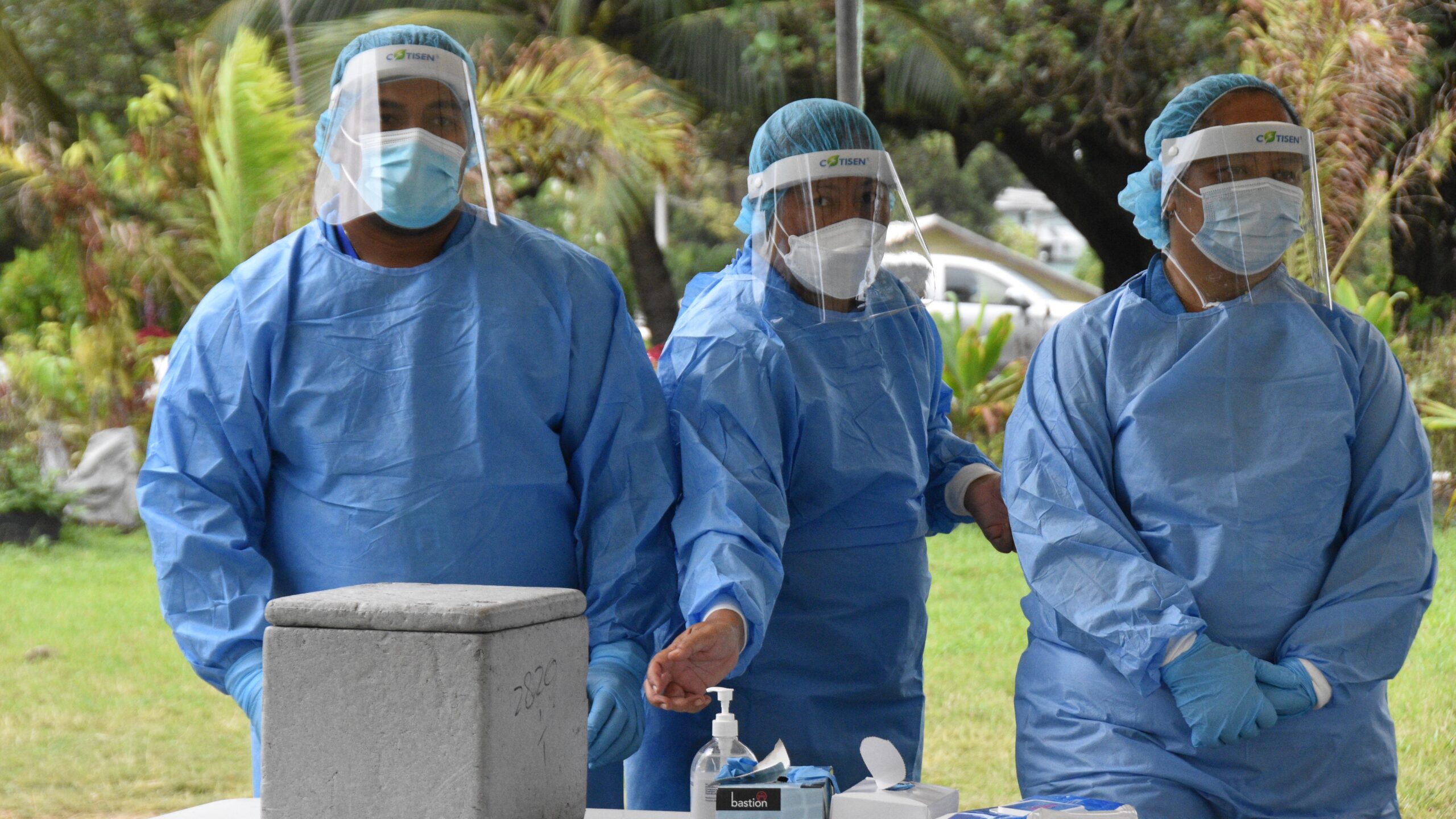Saturday 9 April 2022 | Written by CI News Staff | Published in Economy, National

(FILE PHOTO) Te Marae Ora Ministry of Health staff conducting Covid-19 tests at the Constitution Park. PHOTO: CALEB FOTHERINGHAM/22030315
Government agencies and local businesses are feeling the stress Covid-19 is putting on their already depleted workforce.
This after some of their staff members, who are household contacts of positive cases but returning negative tests, are choosing to remain in isolation despite the availability of the essential workers pass.
The private sector earlier told Cook Islands News that they were cutting down on their services after losing staff members to isolation.
Te Marae Ora Ministry of Health this week said their available staff members were working 12-hour days and they had to call in Pa Enua personnel for support as resources are stretched.
Cook Islands Chamber of Commerce chief executive Rebecca Tavioni said the main impact was from negative household contacts needing to isolate.
However, she said the launch of the essential workers passes, which allows negative household contacts to work was elevating pressure.
Government has issued 700 worker passes (as of last night).
Tavioni said the private sector was “100 per cent” making the most of the pass.
“Just today (Thursday) I was speaking with at least three of our large employers on the island and all three have said it’s been great,” Tavioni said.
“We’ve had some of them apply for passes on the same day they are getting a response back online, so it’s working really well for them.”
Tavioni said visitors are also feeling the impact of isolation with services being closed.

She also said the impact of isolation on businesses wouldn’t be so bad if they could bring in migrant workers.
The Prime Minister’s Office has acknowledged the stress that the isolation and quarantine system has caused on the workforce, and anticipates these restrictions will ease in the next few weeks.
Prime Minister Mark Brown told Cook Islands News: “The main reason for isolation was to reduce the rate of spread of Covid-19 so that we do not have everyone having to isolate all at once.”
“We have done this successfully by ‘flattening the curve’. We have spoken about the ‘peak’ period which we are currently in, and this is the period of most infections and isolations at once. We know that this is when we will be at our busiest for monitoring and delivering health and food packs to households.”
Brown said the government had “expected and anticipated” the stress quarantining and isolating would place on the workforce.
“People are aware that once in isolation they will be released in seven days.
“I think the biggest achievement by our preparation we have seen is that we have no people hospitalised. We should be grateful that we are only being asked to isolate and that food is delivered to you.
“In our neighbouring countries hundreds of people are being hospitalised, some are having a tube put down their throat, and others are burying loved ones. So, let’s put this into context and be grateful.”

Prime Minister Brown said “we will reach a stage either in the next few weeks or month where more restrictions on Rarotonga will be lifted as they become redundant”.
Asked about whether the government would reduce the isolation period to three days—as Australia has— Brown said Australia is more advanced in their Covid-19 infection cycle by a few months.
“They have been able to lift restrictions as certain states have already peaked. I expect we will follow suit on similar easing of restrictions.
“Remember we still must manage the Pa Enua (outer islands) when Omicron reaches them. We have a well-considered step by step approach for easing restriction, not an open season approach,” he said.
Chamber of Commerce chief executive Tavioni said she was unsure if the Cook Islands was ready to further ease isolation restrictions because the consequences of doing so went beyond the private sector.
“There are other restrictions that I would want to see eased and those restrictions are the travel restrictions into our country from beyond New Zealand, so that needs to ease in my opinion and the sooner the better.
“The Cook Islands is not the only one open for business now in New Zealand, we have to compete with our other Pacific neighbours, so anything we can do to do to ease the amount of customer effort it takes to get to our country is what I would like to see.”